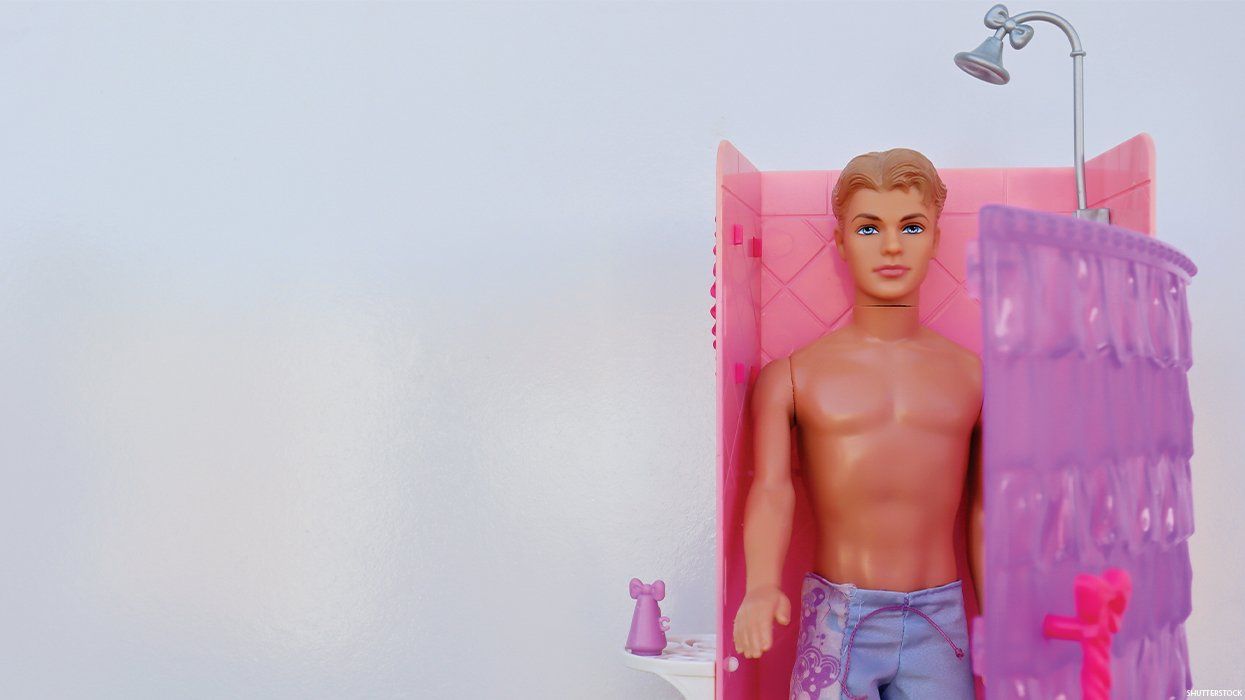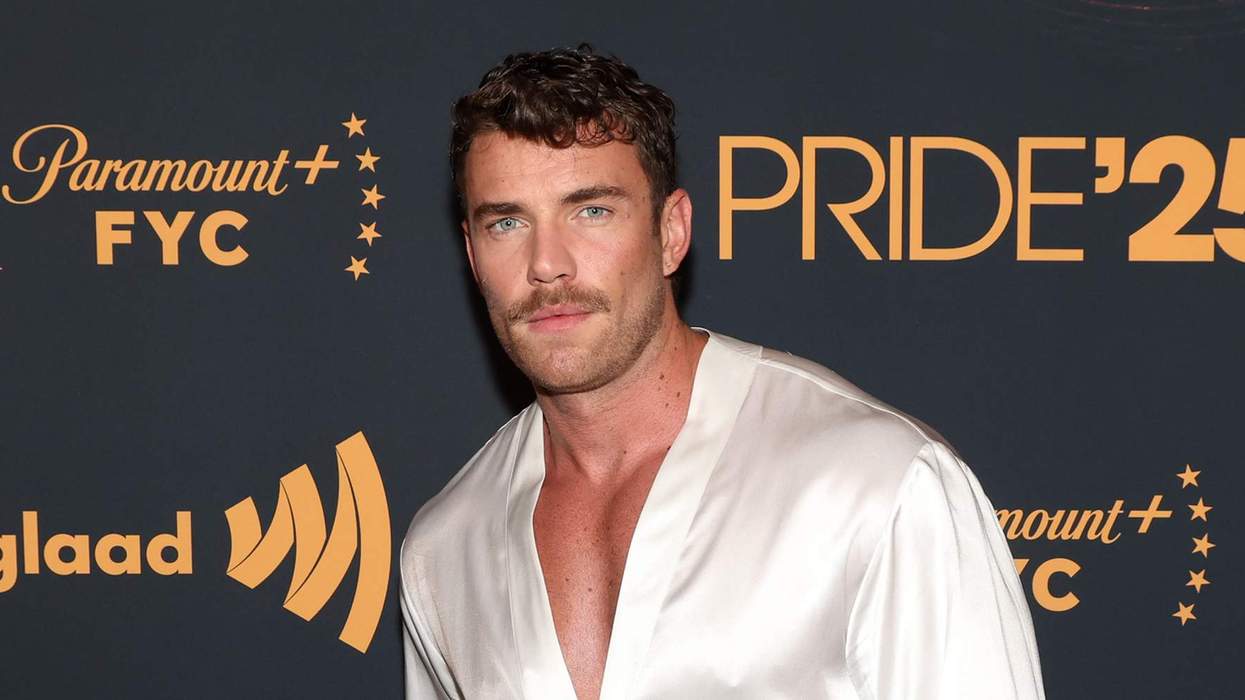After a many-year break, this issue of Out brings back the Most Eligible Bachelors list. Silly, yes. Wonderful? Absolutely.
It is gay kitsch, something from the old days. A list of hot, single queer men in the public eye comes from when gay rags put straight, gay, possibly gay, and so-hot-we-wish-they-were-gay men on their covers — when they were less averse to being smut. We take ourselves seriously now. An eligible bachelor list is not serious: It’s fun. It’s fangirling with some sincere appreciation: Thank you for being one of us. You had the courage to come out and do something cool. And you’re hot.
I have not seen the list. I will when you do. But when the editors said it was coming, I asked the obvious question: What are its criteria? What makes someone an eligible bachelor in 2023? This is a good question for everyone to ask — for those who are in the dating game or just fucking around, as most are. If you are in a relationship, it is never bad to let this question sit with you for a bit: Would you put them on the cover of your magazine? Our editors will decide who Out deems worthy of its love, and I must forever decide who is worthy of mine. So must you. So must we all.
Out has evolved since its last “hot list,” as have I. The things we find attractive shift with age and knowledge, and these things are always worth examining. If you are of a certain age, you know the “Sunscreen” song (also called “Wear Sunscreen” and “Everybody’s Free”). It was a weird pop culture phenomenon from the late '90s: a seven-minute graduation-style speech spoken in a beautiful, earworm-inducing cadence by Australian voice actor Lee Perry. The speech is mixed over a sampling of “Everybody’s Free (To Feel Good)” by Rozalla, with added vocals by the beautiful singer Quindon Tarver. This remix first appeared on Baz Luhrmann’s 1998 album Something for Everybody and was later added as a bonus track for the 10th-anniversary rerelease of the soundtrack to his 1996 film Romeo + Juliet. Rumors still circulate online that the speech was written by everyone from Ernest Hemingway to George Orwell, but it was actually penned by Mary Schmich in 1997 for Schmich’s column in the Chicago Tribune.
The song has been referenced, quoted, and mentioned endlessly on the internet. It has probably been quoted under many senior yearbook portraits. At a hookup recently in Berlin, the guy fucking me could barely speak English and knew little of American culture, but he knew the “Sunscreen” song. He could quote it word for word. So could I. It is one of few songs that makes me cry every time. Why? Because its advice — which ranges from “wear sunscreen” to “don’t feel guilty if you don’t know what you want to do with your life” — rings true.
The song feels like a guide to living, one that has touched so many people. It says something about us that we all connected to a song with lines like, “You are not as fat as you imagine.” It’s like we are people raised without guidance — children looking for someone to say life is bearable, that it will be OK. Here are its best lines: “Don’t be reckless with other people’s hearts. Don’t put up with people who are reckless with yours.” And: “Enjoy your body. Use it every way you can. Don’t be afraid of it or what others may think of it. It is the greatest instrument you will ever own.”
I have enjoyed my body. It took me years to think it was worth enjoying, that I deserved pleasure. Every day I live as hedonistically as I do is a win over those closeted years when I thought no one would want me. They are a triumph over my early years with HIV when I felt untouchable. But how long has it taken those other lessons to sink in? I have listened to the song hundreds of times, but I still let people be reckless with my heart. And shamefully often, I am reckless with theirs. I am a grown man, but I still can’t always tell if someone is good for me. Can anyone?
I have learned some things. Someone can’t just be hot. I’ve had hot. It’s not enough. Someone does not even have to like the sex I like. My longest and best relationship was with someone I did not have sex with, and he remains one of my great loves.
In 2023, an eligible bachelor for me must be someone who makes me feel good about myself. They must respect how much I need my own company (in other words, they must leave me alone 50 percent of the time). They must look past my faults to see the person I am trying to be and help me be that. They must have done some “inner” work: They must know themselves, love themselves, and be enough for themselves, especially when I’m not around. They must remember which ear is my deaf one and the things my dad said — the old, deep wounds that bubble to the surface when I least expect them. They must be kind to waiters, enjoy music, and respect the magic of talking and words. And yes, they must be hot.
Some men have met these criteria. Those who did not helped shape those standards. Luckily for me, everyone I tried to love was good to me, even when I did not deserve it. Everyone mattered. That’s love: Even when it is unhealthy and cruel, it teaches you how to do it better. Before I was a sex columnist and author, I had a blog. (It’s still around if you’re interested at LoveBeastly.com — I answer sex questions there.) In an early post, written in college, I wrote about relationship deal-breakers. At the time, I was reading articles by various so-called experts in dating. They all had their own lists of deal-breakers to watch out for, so I thought I should too. I was too young to write this, but I think my deal-breakers aged well:
1. You both must be out of the closet or in it.
2. You can date over many differences — cultural, religious, financial — but political differences are a deal-breaker.
3. You both must want the same freedoms and permissions. A monogamous person cannot date a nonmonogamous person, etc. Even two different versions of nonmonogamy are a deal-breaker.
We are, of course, talking about life here, so there are exceptions to everything, and if any lesson can be distilled from these weird laps around the sun, it’s that love in all of its mystery cannot be reduced to rules. There are no dating experts. Everyone is trying to figure this out.
Those old deal-breakers are OK, but over the years, they grew — or rather, my list of needs increased. Whenever I have tried to describe the perfect man, the arrow inevitably points back at me. Stating my needs makes me wonder if I meet them for others. Am I an eligible bachelor? Do I listen well enough? Am I patient? In my work and life, I fight shame, and I want everyone I love to find in me a place where shame dies. I am not rich. Wealth doesn’t matter, but being smart with money does, and I am. So hey, Out magazine, this is my official application. I am throwing my name in the hat.
When I came out, I wanted, like many, a very hetero future: marriage, kids, and a love that lasts forever. That is no longer my life. I am a wild spirit. I cannot be caught in a net. But every now and then, I touch down and land on someone who understands how my weird, dumb heart works. Maybe someone like that will marry me. Who knows? If there is anywhere to find them, it’s in Out. All smutty gay magazines of the past — like Honcho, Blueboy, Drummer, and many others that were the predecessors of Out — had personal ads in the back of the book. Today, you can find old audio recordings of personal ads from the early days of radio and television, and vintage magazine collectors like me read them in print, confessions from ghosts: lonely men telling unknown listeners they were wearing a naughty dress and wanted someone to use them hard. In print, you had it all: BDSM masters seeking slaves, anon tops looking to breed, or simply nice, closeted guys hoping to grab a beer. Contact details were listed. Call for a good time.
So here’s mine: Nice guy, kinky, likes sad songs. Maybe not a “most eligible bachelor,” but single and committed to sexual freedom, mine and yours. Loves books and bottoming. I don’t believe in God — I just believe in us. I believe in a world where everybody’s free to feel good.
Alexander Cheves is a writer, sex educator, and author of My Love Is a Beast: Confessions from Unbound Edition Press. For a good time, tweet @badalexcheves.
This article is part of the Out July/August issue, out on newsstands July 4. Support queer media and subscribe — or download the issue through Amazon, Kindle, Nook, or Apple News.






























